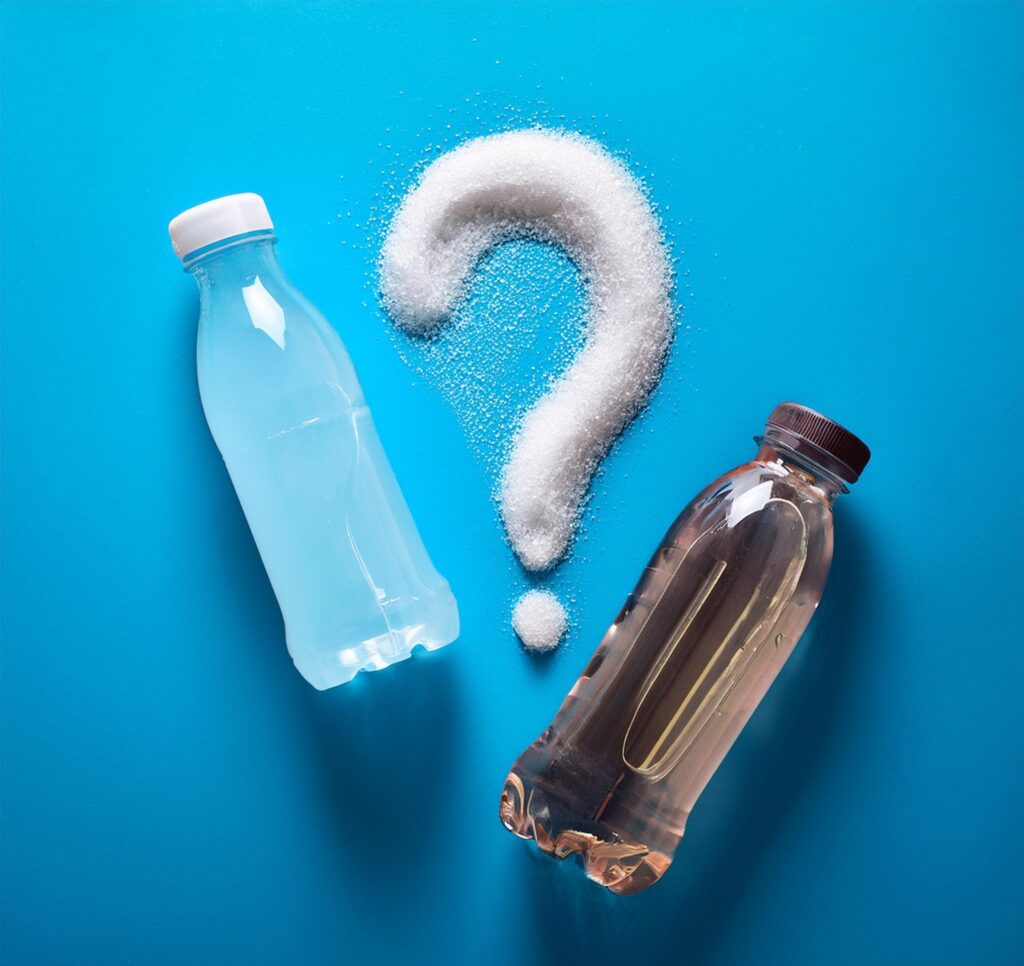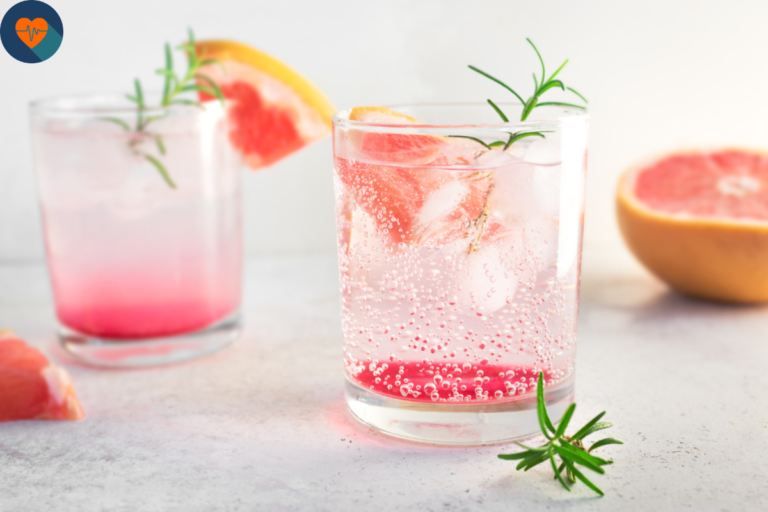Table of Contents
Introduction
Brief Overview: The Rise of Vitamin Water
In recent years, vitamin water has risen to prominence as a popular alternative to plain water. Touted as a healthful hydration option packed with essential nutrients, this brightly colored beverage has become a fixture in the hands of health-conscious individuals. But beneath its vibrant labels and enticing flavors lies a question: Is vitamin water genuinely good for you, or is it just another sugary drink disguised as a wellness product?
Why the Hype? Understanding the Appeal
The allure of vitamin water stems from its promises: an easy way to stay hydrated while replenishing vitamins and minerals. Many people are drawn to the idea of getting more out of their drinks—whether it’s a vitamin boost or enhanced athletic performance. Clever marketing campaigns have positioned it as the perfect blend of health and refreshment, but how much of this hype holds up under scrutiny?
What Exactly Is Vitamin Water?
A Closer Look at What’s Inside
At its core, vitamin water is a beverage infused with added vitamins and minerals, often alongside flavorings and sweeteners. Most brands include common vitamins like B and C, and some even add electrolytes to cater to athletes or fitness enthusiasts. However, it’s essential to recognize that not all vitamin waters are created equal, and the ingredients can vary significantly between brands.
Vitamins, Sugar, and Artificial Ingredients: The Breakdown
In addition to vitamins, many versions of vitamin water contain surprising levels of sugar and artificial ingredients. This includes everything from high-fructose corn syrup to artificial sweeteners like sucralose. These added ingredients can transform a seemingly healthy drink into a sugary concoction with limited nutritional benefits. Some brands also use synthetic vitamins, which might not be as bioavailable as the vitamins found in whole foods.
How Vitamin Water Claims to Benefit Your Health
Promises of Hydration and Vitamin Boost
The main selling point of vitamin water is its supposed dual benefit: hydration and a vitamin infusion. With the convenience of a single bottle, you’re meant to quench your thirst while topping up on essential nutrients. For those who struggle to meet their daily vitamin requirements, it can seem like a quick and easy solution.
Does It Really Help Fill Nutrient Gaps?
While vitamin water does offer some added nutrients, the amounts are often minimal, and they may not make a significant difference to your overall diet. Additionally, many of the vitamins in these drinks—such as vitamin C and B-complex vitamins—are water-soluble, meaning that excess amounts are simply flushed out of your system. This raises the question of whether you’re paying extra for something that your body doesn’t actually need.
The Nutritional Profile of Vitamin Water
How Many Calories Are You Actually Drinking?
Though vitamin water is marketed as a healthy drink, some varieties contain a surprising number of calories, primarily from added sugars. A typical bottle can have anywhere from 100 to 150 calories, which might not seem like much, but those calories can add up quickly throughout the day—especially if you’re drinking vitamin water in place of regular water.
Added Sugars: How Sweet Is It?
Sugar is one of the most controversial ingredients in vitamin water. While some brands offer sugar-free options, many varieties are packed with added sugars, rivaling that of soft drinks and fruit juices. Consuming too much added sugar has been linked to a variety of health issues, including obesity, heart disease, and diabetes, which makes the sugary content of vitamin water a cause for concern.
Do the Vitamins in Vitamin Water Make a Difference?
Are the Added Vitamins Necessary?
For most people, the vitamins added to vitamin water aren’t necessary. If you’re already consuming a balanced diet, you’re likely getting enough of these vitamins from food. The body absorbs nutrients more efficiently from whole foods than from fortified drinks, which means that the vitamins in vitamin water may not be as effective as you’d hope.
Comparing Vitamin Water to Whole Food Sources
When comparing vitamin water to natural sources of vitamins, the difference is striking. For example, a single orange can provide you with all the vitamin C you need for the day, without any added sugar or artificial ingredients. Whole foods like fruits, vegetables, and lean proteins are superior sources of vitamins because they come with fiber, antioxidants, and other nutrients that support overall health.
Is Vitamin Water Just Another Sugary Drink?

Sugar Levels Compared to Soft Drinks and Juices
In many cases, the sugar content of vitamin water isn’t much lower than that of a standard soda or juice. A bottle of vitamin water can contain up to 30 grams of sugar, which is roughly the same amount found in a can of cola. This raises concerns about its health benefits, especially when consumed frequently.
Hidden Sugars: What You Should Know
Even in “diet” or “low-calorie” versions of vitamin water, artificial sweeteners can be used to replace sugar. While these sweeteners may reduce calorie intake, they come with their own set of controversies. Some studies suggest that artificial sweeteners may have negative effects on gut health and could potentially increase sugar cravings over time.
Vitamin Water Varieties: Are They All the Same?
Different Flavors, Different Formulas
Not all vitamin waters are created equal. Some varieties boast specific health benefits, such as added antioxidants or electrolytes, while others are simply flavored with a small amount of vitamins. It’s important to read the label carefully and be aware of the differences in sugar content, calorie count, and the types of vitamins included.
Which Vitamin Water is “Healthier”?
Choosing the “healthiest” vitamin water can be tricky. Low-sugar or sugar-free versions may seem like a better choice, but they often contain artificial sweeteners. On the other hand, full-sugar varieties offer natural sweetness but at the cost of added calories and potential spikes in blood sugar.
The Role of Electrolytes in Vitamin Water
Does It Rehydrate You Better Than Water?
Some varieties of vitamin water are marketed as electrolyte-enhanced, which can be appealing to athletes or those recovering from illness. Electrolytes—such as sodium, potassium, and magnesium—are essential for maintaining fluid balance in the body, particularly after intense exercise. However, for the average person, plain water is usually sufficient for hydration, and the added electrolytes in vitamin water may not provide a significant benefit.
Do You Need Electrolytes in Your Daily Drink?
For most people, daily electrolyte supplementation isn’t necessary. Unless you’re engaging in prolonged, intense exercise or have specific medical needs, your body’s electrolyte balance can be maintained through a regular diet and adequate hydration. Relying on vitamin water for electrolytes may be unnecessary and could introduce excess sugars or artificial ingredients into your diet.
Is Vitamin Water Beneficial for Athletes?
How It Compares to Sports Drinks
For athletes, hydration is crucial, and vitamin water often seems like a more health-conscious choice than traditional sports drinks. However, sports drinks are specifically formulated to replenish both fluids and electrolytes lost during intense activity. While vitamin water can serve a similar function, it’s not always as effective in delivering the optimal ratio of electrolytes and carbohydrates needed for recovery.
When Might Vitamin Water Be Useful Post-Workout?
Vitamin water can be a convenient option post-workout, particularly if you’re in need of a quick vitamin boost and hydration. However, its effectiveness as a recovery drink largely depends on the intensity of your exercise and your individual needs. For light workouts, plain water and a balanced meal may be all you need, while more intense sessions might call for a drink that provides more targeted replenishment.
Potential Health Risks of Drinking Vitamin Water
Overconsumption of Certain Vitamins
While vitamins are essential for health, too much of a good thing can be harmful. Consuming large amounts of certain vitamins, such as B6 or niacin, through fortified drinks like vitamin water, can lead to unwanted side effects such as nausea, nerve damage, or skin irritation. It’s important to remember that vitamin water is often fortified with amounts well beyond what’s necessary for daily intake.
The Impact of Excess Sugar on Your Health
The added sugars in many varieties of vitamin water can pose significant health risks when consumed regularly. Excessive sugar intake is associated with a variety of chronic conditions, including type 2 diabetes, heart disease, and obesity. For those looking to reduce their sugar consumption, vitamin water may not be the best choice, especially when healthier hydration options are available.
Is Vitamin Water a Good Option for Weight Loss?
Can It Fit into a Healthy Diet?
In the context of weight loss, vitamin water might not be the best choice. Although marketed as a healthy alternative to soda, many versions are loaded with sugars that can hinder weight loss efforts. If you’re trying to manage your weight, opting for sugar-free, low-calorie drinks or plain water is a more effective strategy.
The Calorie Trap: Why It May Sabotage Your Efforts
Vitamin water’s calories can add up quickly, especially if you’re drinking multiple bottles throughout the day. Unlike food, these calories don’t contribute to satiety, meaning you’re more likely to consume excess calories without realizing it. This can be particularly problematic for those trying to cut back on overall calorie intake.
Vitamin Water vs. Plain Water: Which Is Better?
Hydration: Does Vitamin Water Really Do More?
When it comes to staying hydrated, plain water remains the gold standard. While vitamin water offers added nutrients, the benefits may not outweigh the risks of added sugars and calories. For most people, plain water is all they need to stay hydrated throughout the day.
When Plain Water is the Healthier Choice
In most cases, plain water is the healthier and more economical choice for hydration. It’s calorie-free, sugar-free, and does an excellent job of keeping you hydrated without any unnecessary additives. If you’re looking to boost your vitamin intake, focusing on whole foods or taking a high-quality multivitamin may be a better approach.
How to Spot Marketing Gimmicks in Vitamin Water Ads
Misleading Health Claims: What to Watch For
Vitamin water is often marketed with bold health claims, such as “supports immunity” or “boosts energy.” However, these claims can be misleading. The vitamins in the drink may not be in sufficient quantities to provide meaningful benefits, and the added sugars can negate any positive effects. It’s crucial to look beyond the marketing and understand what you’re actually getting in each bottle.
Understanding Labels: What They Don’t Tell You
The labels on vitamin water can be tricky to decipher. Terms like “natural flavors” and “enhanced with vitamins” sound healthy, but they don’t always paint the full picture. Be sure to read the nutrition facts and ingredient list carefully to get a clearer understanding of what’s inside your drink.
Healthier Alternatives to Vitamin Water
DIY Vitamin Water: Easy Recipes to Try

If you enjoy the idea of flavored, nutrient-rich water, why not make your own? DIY vitamin water is a simple, cost-effective way to stay hydrated without added sugars or artificial ingredients. Infuse water with fresh fruits like berries, citrus, and herbs for a natural vitamin boost.
Better Hydration Options: From Coconut Water to Herbal Teas
There are plenty of healthier alternatives to vitamin water that provide both hydration and nutrients. Coconut water, for example, is naturally rich in electrolytes and contains far less sugar than most commercial vitamin waters. Herbal teas are another excellent option, offering hydration along with a variety of health benefits depending on the herbs used.
When Should You Consider Drinking Vitamin Water?
Occasional Use: When It Might Make Sense
For most people, drinking vitamin water should be an occasional choice rather than a daily habit. It can be a convenient option during times when you need a quick hydration and vitamin boost, such as after a workout or while traveling. However, relying on it too frequently can lead to excessive sugar consumption and unnecessary vitamin intake.
Special Circumstances: Is It Ever Necessary?
In certain situations, vitamin water may be useful. For example, athletes or individuals with specific health conditions that require electrolyte replenishment may benefit from drinking vitamin water. However, these needs are generally better met through targeted supplements or specific sports drinks designed for recovery.
Environmental Impact of Vitamin Water Bottles
The Plastic Problem: Bottled Vitamin Water and Waste
Like other bottled beverages, vitamin water contributes to plastic waste. Single-use plastic bottles are a significant environmental concern, with millions ending up in landfills and oceans each year. Even when recycled, the production and transportation of these bottles have a sizable carbon footprint.
Sustainable Alternatives to Reduce Your Impact
One way to reduce your environmental impact is by choosing reusable bottles and making your own flavored water at home. Not only does this cut down on plastic waste, but it also gives you more control over the ingredients in your drink. If you do buy bottled vitamin water, be sure to recycle the bottles responsibly.
What Experts Say: Nutritionists Weigh In on Vitamin Water
Insights from Health Professionals
Nutritionists often caution against relying on vitamin water for daily hydration, emphasizing the importance of whole foods and plain water. They point out that the added vitamins in vitamin water are often unnecessary for individuals with balanced diets and that the sugar content can be detrimental to overall health.
What to Consider Before Making It a Staple
Before making vitamin water a regular part of your diet, it’s important to consider whether you truly need the added vitamins and whether the sugar content aligns with your health goals. Consulting with a healthcare provider or nutritionist can help you determine if vitamin water is a smart choice for you.
The Cost Factor: Is Vitamin Water Worth the Price?
Comparing the Costs to Other Drinks
When it comes to price, vitamin water is often more expensive than plain bottled water, and even some other flavored drinks. While it may seem like a worthwhile investment for the added vitamins, you might be paying more for marketing and packaging than for real health benefits.
Are You Paying for Marketing or Real Benefits?
Many people assume that because vitamin water is marketed as a health product, it must be worth the higher price tag. However, the truth is that much of what you’re paying for is the brand name and the idea of added benefits, rather than any significant nutritional advantage over other drinks.
Who Should Avoid Vitamin Water Altogether?
Individuals with Diabetes or High Blood Pressure
People with diabetes or high blood pressure should be especially cautious when consuming vitamin water. The high sugar content in many varieties can cause blood sugar spikes and negatively impact heart health, making it a poor choice for these individuals.
Those Looking to Cut Back on Added Sugars
If you’re trying to reduce your intake of added sugars, vitamin water may not be the best option. The hidden sugars in these drinks can quickly add up, even in varieties that claim to be healthier or low-calorie. Opting for plain water or other unsweetened beverages is a better choice for those looking to maintain a lower-sugar diet.
Conclusion
Final Thoughts: Is Vitamin Water Good for You?
Vitamin water can offer some benefits, but they are often outweighed by the potential downsides. For individuals with specific nutritional needs or active lifestyles, it can provide a convenient source of vitamins and hydration. However, for the average person, the high sugar content and unnecessary additives make it a less-than-ideal choice.
Should You Skip It or Sip It? Your Best Hydration Options
Ultimately, whether you should skip or sip vitamin water depends on your health goals and lifestyle. While it may be a convenient option in certain circumstances, plain water, whole foods, and healthier hydration alternatives should be your go-to choices for everyday hydration.

